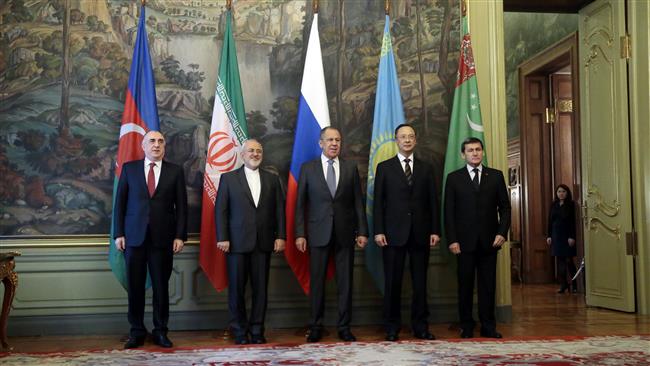After more than 20 years of talks, the five Caspian littoral countries of Azerbaijan, Iran, Kazakhstan, Russia and Turkmenistan have reached an agreement on the legal status of the sea.
“We have substantively discussed issues on the current agenda in the Caspian. We paid special attention to the work on the draft convention on the legal status of the Caspian Sea. I am pleased to tell you that we have found solutions to all outstanding key issues linked to this document. The text of the convention is practically ready,” Russian Foreign Minister Sergey Lavrov said after a meeting of foreign ministers from the Caspian region in Moscow, held from December 4-5, according to RIA news agency.
The text is now awaiting approval from the presidents of each country, who are all expected to sign it during the 5th Caspian Summit scheduled for Kazakhstan sometime next year.
The issue of determining the legal status of the Caspian Sea has long troubled regional governments, and hopes are high that 2018 will see the issue of delineating the sea’s boundaries and countries’ territorial waters settled.
The Caspian Sea is the largest enclosed body of water on the earth by area, and is often described as the world’s largest lake. After the collapse of the Soviet Union in December 1991, the emergence of four new independent states – Russia, Azerbaijan, Turkmenistan and Kazakhstan – along the sea’s borders presented geopolitical disputes.
The Caspian Sea littoral states have held over 40 meetings and discussions prior to agreeing on principles of the draft convention of the sea. Once signed, the convention on the status of the Caspian Sea will be the guarantor of security and stability in this region and will be a universal document regulating cooperation in many spheres.
"Finally, it will be possible to boldly say that the Caspian Sea will become a sea of cooperation. Kazakhstan has a very wide range of interests in the Caspian, they are the use of water resources, the use of the sea for peaceful purposes; we have an economic interest, and the issue of environmental protection is also important,” said Zhumabek Sarabekov, an expert at the Institute of World Economy and Politics (IWEP) in Kazakhstan, during a video conference at the office of Sputnik Azerbaijan news agency.
Kazakhstan, Russia and Azerbaijan had been in agreement with delineating the sea along median lines, and had bilateral agreements with one another based on the principle. However Iran, with some of the shortest coastline out of the five states, had insisted on creating a single body that would give it a one-fifth share of the sea.
The Caspian Sea is becoming an increasingly important transit route, as Eurasian transportation and logistics projects are launched. The recently launched Baku-Tbilisi-Kars railway provides a direct exit from the Caspian Sea to Europe, and Kazakhstan and Azerbaijan are extremely interested in making the Trans-Caspian route fully operational.
"The inauguration of the Baku-Tbilisi-Kars railway and the construction of the North-South transport corridor will turn Baku into a transport hub of the Caspian region,” said Azerbaijani expert and the head of the Center for Caspian Studies, Cingiz Ismayilov.
“Whether we like it or not, we should all cooperate to solve problems such as resources development, ecology, biodiversity protection, development of transport communications, cultural ties,” Ismayilov said.
However, the Director of the Russian Institute of Caspian Cooperation Sergey Mikheyev is not convinced that the recently agreed-to terms will solve all of the outstanding issues.
"Lavrov, indeed, made an important statement, but the agreement will be signed at the summit by the presidents, but so far this has not happened. In addition, the details of the agreement have not yet been disclosed, and I think the reason is that they are not fully confident that nothing will collapse,” said Sergey Mikheyev.







 Iran's senior military leaders described the drone and missile attack on Israel on April 14 night as “successful".
Iran's senior military leaders described the drone and missile attack on Israel on April 14 night as “successful".
 The number of evacuees from flooded areas in Kazakhstan has reached 97,852 people, including about 32,856 children since March 27.
The number of evacuees from flooded areas in Kazakhstan has reached 97,852 people, including about 32,856 children since March 27.
 Azerbaijan officially unveiled the logo for the upcoming 29th session of the Conference of the Parties to the United Nations Framework Convention o...
Azerbaijan officially unveiled the logo for the upcoming 29th session of the Conference of the Parties to the United Nations Framework Convention o...



